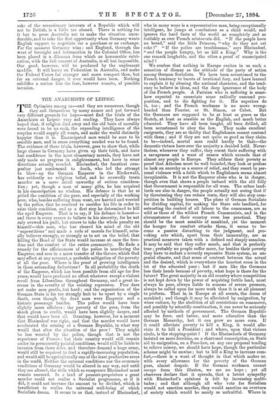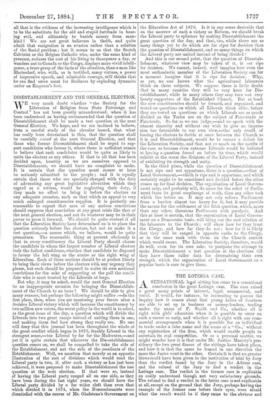THE ANARCHISTS OF LEIPSIC. T HE Optimists among us—and they are
numerous, though they call themselves by many names and put forward very different grounds for hope—must find the trials of the Anarchists at Leipsic very sad reading. They have always hoped that, if religion died away and the old basis of morality were found to be no rock, the expanding intelligence of the sceptics would supply all wants, and make the world distinctly happier than it is. Emancipated men would be sure to be sensible men, and in sense everything needed was to be found. The evidence of these trials, however, goes to show that, while large classes in Germany have given up their faith, and have lost confidence in the most elementary morals, they have not only made no progress in enlightenment, but have in some directions actually receded. Rheinsdorf, the fanatical com- positor just condemned to death, who led the attempt to blow- up the German Emperor in the Niederwald, has evidently no religious belief, and he avowedly treats murder as a mere detail unworthy of serious considera- tion ; yet, though a man of many gifts, he has acquired in his emancipation no wisdom. His defence is that he so pitied the condition of the poor, and especially of the working poor, who, besides suffering from want, are harried and worried by the police, that he resolved to sacrifice his life in order to raise their condition, and as a first step he determined to kill the aged Emperor. That is to say, if his defence is honest— and there is every reason to believe in his sincerity, for he not only avowed his guilt, but strove to take the whole penalty on himself—this man, who has cleared his mind of the old "superstitions" and made a code of morals for himself, actu- ally believes strongly, so strongly as to act on the belief, that killing the Head of the State would increase at once the free- dom and the comfort of the entire community. He finds a. remedy for the officiousness of the police in murdering the Emperor, and sees in a mere transfer of the throne, which God may effect at any moment, a probable mitigation of the poverty of all the poor. Where is the proof of growing intelligence in those astounding deductions ? In all probability the death of the Emperor, which has been possible from old age for five years, would have produced no effect whatever except a violent recoil from Liberalism throughout Germany, and a great in- crease in the severity of the existing repression. Fear does not make men gentle, but hard ; and the organisation of the German State is far too strongly knit to be upset by a single death, even though the dead man were Emperor and a historic personage besides. The police would have been slightly more officious ; the poverty of the poor, from the shock given to credit, would have been slightly deeper, and that would have been all. Granting, however, for a moment that Rheinsdorf was right, and that the murder would have accelerated the coining of a German Republic, in what way would that alter the situation of the poor ? They might be less worried by the police, though that is not the experience of France ; but their country would still remain under its permanently painful conditions, would still be liable to invasion from three sides, and therefore demand a huge army, would still be required to feed a rapidly-increasing population, and would still be agriculturally one of the least productive areas in the world. Neither the external conditions nor the economic conditions of Germany would be altered in any way, and until they are altered, the evils which so exasperate Rheinsdorf must remain uncured. In a land of peasant-proprietors a great murder could not realise a Socialist programme, or if it did, it could not increase the amount to be divided, which is insufficient to realise the universal well-being of which Socialists dream. It seems to us that, instead of Rheinsdorf, who in many ways is a representative man, being exceptionally intelligent, he jumps at conclusions as a child would, and ignores the hard facts of the world as completely and as foolishly as ever French aristocrats did. " If the people have no bread," said the little Princess, " why do they not eat cake ?" " If the police are troublesome," says Rheinsdorf, " and the people hungry, let us kill a King." Why is the one remark laughable, and the other a proof of emancipated mind ?
We confess that nothing in Europe excites in us such a sensation of dismay as the attitude of the party of action among German Socialists. We have been accustomed to the French tendency to bursts of irrational fury, and have learned to explain it by abusing the national character, and the tend- ency to believe in ideas, and the deep ignorance of the body of the French people. A Parisian who is suffering is some- how expected to enunciate some radically unsound pro- position, and to die fighting for it. His superiors do it, too ; and the French workman is no more wrong- headed than Fourier, or St. Simon, or Cabet. But the Germans are supposed to be at least as grave as the Scotch, at least as sensible as the English, and much better educated. They have all been taught, all been drilled, all been accustomed to obey the law. They make excellent emigrants, they are so thrifty that Englishmen cannot contend with them ; and if they are not quite so good as they claim to be—indeed, mortal man could hardly be that—the domestic virtues have over the majority a decided hold. Never- theless, whenever they suffer, they resent their suffering with a savageness and a want of reason which exceeds that of almost any people in Europe. They adduce their poverty as proof that Atheism must be well founded, they look or profess to look on anarchy as a source of relief, and they resort to per- sonal violence with a faith which to Englishmen seems almost inexplicable. It is not the Emperor alone who is in danger, though even that shows a people imbued with the old folly that Government is responsible for all woes. The urban land- lords are also in danger, the people actually not seeing that if by threatening they can reduce rents, they will also stop com- petition in building houses. The plans of German Socialists for dividing capital, for making the State sole landlord, for entrusting the control of all labour to the communes, are as wild as those of the wildest French Communists, and in the circumstances of their country even less practical. They should be the most sensible of mankind, yet the moment the hunger for comfort attacks them, it seems to be- come a passion disturbing to the judgment, and pro- voking acts which, apart from their immorality, are as practical measures taken with a defined end simply senseless. It may be said that they suffer much, and that is perfectly true ; probably no people suffer more, for besides their poverty they have to endure a severely repressive State system, an un- genial climate, and that sense of contrast between the actual and the desired, which is everywhere the heaviest cross in the lot of the educated poor ; but if men like the Germans lose their heads because of poverty, what hope is there for the future? The great majority in an old country where competition is not kept down by the power of acquiring fertile land, must always be poor, always liable to seasons of severe pressure, always be called upon for more work than it is at all pleasant to perform. That is, in Europe at all events, the doom of mankind ; and though it may be alleviated by emigration, by wiser culture, by the abolition of all restrictions on commerce, and possibly by scientific combination, it can never be seriously affected by methods of government. The German Republic may be freer, and better, and more educative than the German Monarchy, but it can grow no more corn. If it could alleviate poverty to kill a King, it would alle- viate it to kill a President ; and where, upon that vicious circle, is the stopping-point ? If the Rheinsdorfs of Germany insisted on more freedom, on a shortened conscription, on State aid to emigration, on a Poor-law, on any one proposal tending to relieve misery, we should have hope, though the particular scheme might be unwise ; but to kill a King to increase com- fort,—there is a want of thought in that which makes us, with every allowance for the poverty of the German poor, almost despair. If the German workmen cannot escape from this illusion, we see no hope ; yet all observers declare that it spreads, that a latent sympathy with Rheinsdorf's opinions is felt by increasing multi- tudes ; and that although all who vote for Socialism would not sanction murder, they would sanction an overturn of society which would be nearly as unfruitful. Where in
all that is the evidence of the increasing intelligence* which is to be the substitute for the old and stupid fortitude in bear- ing evil, and ultimately to banish misery from man- kind ? We are not great believers in thrift, and quite admit that emigration is an evasion rather than a solution of the Social problem ; but it seems to us that the Scotch Calvinist or the Belgian Catholic who, under the same kind of pressure, reduces the cost of his living to threepence a day, or wanders out to Canada or the Congo, displays more vivid intelli- gence, a truer grasp of the facts of the situation, than a man like Rheinsdorf, who, with, as is testified, many virtues, a power of impressive speech, and admirable courage, still thinks that he can find more meat for Berliners by exploding dynamite under an Emperor's feet.



































 Previous page
Previous page